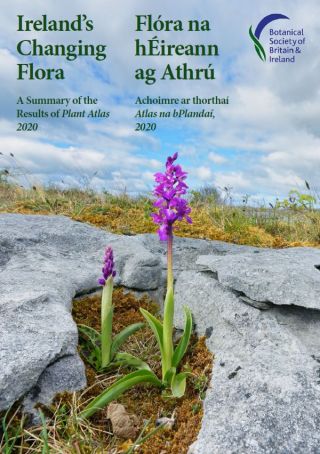Ireland's biodiversity decline continues

The Plant Atlas 2020[1] presents the findings of twenty years of research on Irish flora. The findings are stark and mirror the worrying trend of ongoing biodiversity decline in Ireland. According to The Plant Atlas 2020 more than half Irish native plant species are in decline, with native grasslands suffering the largest decline. These findings echo those of the Biodiversity Working Group[2] which found that 85% of EU protected habitats in Ireland are reported as being in Unfavourable status with 46% demonstrating ongoing declines. The main drivers of this decline are agricultural practices which are negatively impacting over 70% of habitats. The forthcoming recommendations of the Citizen’s Assembly on Biodiversity Loss must be acted upon by Government.
Plant Atlas 2020 – Ireland’s Changing Flora
Plant Atlas 2020 presents a powerful and concerning insight into the changing distributions of our wild plants. In Ireland, nearly 3 million plant records of 1939 species, collected by 2,500 botanists, fed into the Atlas project. Three main trends emerged from the Irish data.
- Most Irish native2 plant species (56%) have declined in range and abundance or both.
- Native grassland plants are those that have suffered the most, but many plants of lakes and wetlands have also declined.
- In contrast, the overwhelming majority (80%) of species introduced into Ireland since 1500 have increased. Most of these non-native species are benign but some have become invasive, with a negative impact on the native flora.
The report finds that the impact of farming and forestry on Irish wild plants since the 1950s has been devastating. Many of the habitats Irish wild plants depend on have been destroyed or altered by farming and forestry since the 1950s. Grassland plants have been impacted the most. Re-seeding, over-fertilising, nitrogen deposition, herbicides, soil drainage, and changes in grazing pressure have all contributed to the decline of species and lakes and wetlands have also been affected. Many peatbogs have been planted with conifers or converted to agriculture, excluding the native bog plants such as heathers and sundew. Peatland habitats are important for carbon storage, and their restoration is essential as part of our efforts to combat climate change. There is evidence that climate change may have affected the Irish flora by helping some southern species to spread northwards.
Biodiversity in Ireland
The Environmental Protection Agency estimates that the economic value of our ecosystem services is around €2.6 billion but that the rate of habitat degradation and loss of biodiversity is accelerating across Europe, including in Ireland. Ireland needs to improve its data collection methods when it comes to biodiversity and to monitor the impact of climate change in this context to protect both our natural resources and our economy. Our natural capital and ecosystems should also be assigned value in our national accounting systems.
The decline of nature, biodiversity and insects, and the impacts, are starkly outlined in a series of international reports from the Intergovernmental Panel on Climate Change[3]. The impact on Ireland is clear from reports from the EPA on water quality, air quality, biodiversity and emissions. Government must treat these reports as an impetus to implement a complete shift in policy away from business as usual and towards transition and adaptation. This requires immediate action and immediate investment. Although initially costly, the returns and dividend we will reap from the investment is significant. It will put Ireland on the pathway to meet 2030 and 2050 targets. It is clear that the 4th National Biodiversity Action Plan must incorporate the monitoring framework to protect our biodiversity and support progress to meet the targets set out in the Global Biodiversity Framework. Implementation of the relevant measures and actions to reach the GBF targets will determine whether or not Government values our biodiversity and whether the recommendations of the Citizens Assembly on Biodiversity Loss will inform the policy process.
Harmful environmental subsidies
Ireland continues to allocate substantial resources to harmful fossil fuel subsidies, €2.2 billion in 2020 and €2.8 billion in 2019. Between 2012 and 2016, €4 billion per annum in taxation was forgone through potentially environmentally damaging subsidies. €2.5 billion went in direct subsidies and preferential tax treatment supporting fossil fuel activities in Ireland and a further €1.6 billion supported other potentially environmentally damaging activities in the Agriculture, Transport and Fisheries sectors. A study by the ESRI found that budgetary cost of these subsidies was over six times higher than the entire carbon tax revenue of the Government in 2017. The value of environmental subsidies is substantial. By ending environmentally damaging tax breaks and investing this money in people, communities and regions that will be most affected by climate adaptation, Government can help to ensure a Just Transition. It also increases the fiscal space available to government in terms of climate policy and protecting biodiversity.
Food waste
Ireland faces significant challenges in meeting current waste targets, with food waste across the entire supply chain has been calculated to be over 770,000 tonnes in 2020. The challenge to reduce this amount to the target level of 50% is significant. Irish households threw away an estimated 241,000 tonnes of food (31% of total) in 2020. This includes food waste collected in kerbside collections, which is equivalent to about 130 kg of food waste per household or 48 kg per person Food waste costs the average Irish household about €60 per month or €700 per year. That’s an annual national cost of €1.29 billion.
It is clear, in order to make progress on biodiversity, nationally and internationally, immediate implementation of policy is key to ensure the 2030 targets do not fall the way of other environmental targets and are missed by a substantial margin.
[1]https://bsbi.org/download/36132/?tmstv=1678351736
[2]Interim Review of the Implementation of the National Biodiversity Action Plan 2017-2021